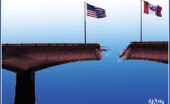Molly Minturn - My family is heartbroken to share that my father died in surgery on Monday, Feb. 10. It…
Wednesday Night #2113
Written by Diana Thebaud Nicholson // September 14, 2022 // Wednesday Nights // Comments Off on Wednesday Night #2113
The Queen is dead. Long live the King!
Britain, the Monarchy & the Commonwealth September 2022-
From the moment the death of Queen Elizabeth II was announced, there was all-out media frenzy – no matter the leanings of the journalist or organization. Coverage can be roughly divided into : mourning – topics ranging from collections of photos of the late Queen from childhood to the last official one taken with newly-minted PM Truss; intrusive and/or fluff pieces about members of the royal family and queries about who will take care of her beloved dogs; pomp & circumstance, starting with the marvelous traditional Accession Council ceremony, funeral procession from Balmoral to Edinburgh to Westminster Hall, and continuing with every detail of the funeral arrangements (will the heads of state travel together by bus?); praise and analysis of every aspect of the Queen’s reign; and predictions regarding the future of the monarchy and the Commonwealth under King Charles III. (We do wish he had chosen another name – the reigns of Charles I and II are not really ones to emulate.) Monarchist, anti-monarchist or neutral – it’s irresistible.
One highly satisfying by-product was the announcement that Lisa Laflamme, recently ousted by Bell Media/CTV in a highly regrettable display of unwarranted -stupid- corporate interference in the newsroom, has been hired by City TV as a special correspondent to lead its coverage from London of the death and legacy of Queen Elizabeth.
Film producer reflects on a ‘monarchy in peril’
Canadian filmmaker and producer John Curtin discusses his latest project “Monarchy in Peril” as King Charles III faces new challenges following Queen Elizabeth II’s death.
John points out that “ABC implies that this doc series is a work in progress when it was actually finished several years ago. Currently hard at work on The Trials of Alan Dershowitz, which promises to be a “doozy”!”
For many -but not as great an audience- the recent news of Ukraine’s successful counteroffensive in Putin’s War is cause for great cheer. Jubilation might be premature.
On Tuesday morning, The Current featured excellent interviews with Globe and Mail reporter Mark MacKinnon; and Evelyn Farkas, executive director of the McCain Institute Ukraine retook swathes of territory previously captured by Russia. Could this be a turning point in the war? (CBC radio)
Jeremy Kinsman and Larry Haas are (almost) ecstatic as they address the brilliant success of the Ukrainian counteroffensive “Ukraine hits Russia hard: what might it mean?” on Tuesday evening’s Diplomatic Community. They agree with Ian Bremmer that the success is due to several factors: “Ukrainian forces have received advanced weapons, training, and intelligence from NATO, and their morale is running high as they are fighting for their land and people” while, as Jeremy points out, not only are the Russian troops exhausted and demoralized, but the Russian military historically has been successful in defensive rather than offensive engagements. The success of the counteroffensive has given European nations renewed determination to overcome the problems they must face this winter. Before celebrating, consider Ian Bremmer’s conclusions that “Ukraine has turned the tide on the war. That makes Russia even more dangerous” Ukrainian counteroffensive leaves Putin with few good options.
The disaster in Pakistan
Jeffrey Sachs argues for ‘climate justice’: The world’s rich countries…have deprived Pakistan of the long-term climatic conditions on which it has built its economy, homes, farms, and infrastructure. If there was a global climate court, Pakistan’s government would have a strong case against the US and other high-income countries for failing to limit climate-changing greenhouse-gas emissions (GHGs). But since there is no global climate court (yet), governments should act like one and allocate the attributable climate losses and damages to those countries that are historically responsible for them. Pakistan (and its neighbors in the Himalayas) would of course have the core responsibility for sustainable management of the land, including reforestation and climate-safe infrastructure.
Narrow majorities are in vogue.
William Ruto was sworn in as Kenya’s president at a ceremony in the capital Nairobi following his narrow election win last month.
Defeated candidate Raila Odinga did not attend. He said he had “serious concerns” about his opponent’s victory.
Mr Ruto won the election with 50.5% of the vote, to Mr Odinga’s 48.8%.
On Wednesday, Swedish PM conceded election defeat to a loose coalition that includes the far-right Sweden Democrats
Her party, the Social Democrats remain Sweden’s largest party with more than 30% of the vote – and the majority in parliament for the right bloc was very slim. The coalition of the SD and the three centre-right parties have a majority of three in the parliament of 349 seats, and there is no formal agreement between the SD and the Moderates, Christian Democrats and Liberals about how they will govern together. So, now what?
No narrow majority for Pierre Poilievre, who won the Conservative Party leadership race with 68.15% of the points on the first ballot
He has promised to fire the Bank of Canada governor — a historically non-partisan position — and has accused him of failing to rein in inflation. Poilievre has railed against COVID-19 restrictions and the federal government’s vaccine mandate for travellers and public servants.He has routinely criticized the World Economic Forum and has said that, if he becomes prime minister, he would forbid his cabinet ministers from attending the annual summit in Davos. But he made no mention of it in his speech.
Aaron Wherry writes In Poilievre, Liberals face a leader who gets under his opponents’ skin. Sounds like the Fall session will be lively -and probably very annoying!
But, take note:
Anaida Poilievre – Leadership Speech Sept. 10th
A perhaps overlooked Conservative party asset in this regard, and also when it comes to the newcomer vote: Poilievre’s wife, Anaida. She gave a rousing and charismatic speech to introduce her husband as the party’s new leader, speaking fluently in not just French, but Spanish. Mrs. Poilievre also shored up her own populist credentials, detailing her experience as the child of Venezuelan immigrants and growing up “paycheque to paycheque.”
Andrew Caddell devotes this week’s column to proposed changes to the Official Languages Act. In Bill C-13 is a Trojan Horse he calls our attention to “an egregious piece of legislation working its way through Parliament, and very few Canadians have heard of it. Its title is anodyne enough: “An Act to amend the Official Languages Act, to enact the Use of French in Federally Regulated Private Businesses Act and to make related amendments to other Acts.” But despite its modest name, Bill C-13 is the Trojan Horse of Canadian politics. By seeking to restructure the official languages framework, it [also opens the door for other provinces to reduce the rights of minority francophones and] could change Canada radically in the years to come.” If you cannot access the full text on the Hill Times, or Andrew’s Facebook page, let me know.
BPEA Fall 2022 conference
The Brookings Papers on Economic Activity (BPEA) was held on 8-9 September. A semi-annual academic conference and journal, it pairs rigorous research with real-time policy analysis to address the most urgent economic challenges of the day. Emphasis on U.S. economy, however the authors of Working From Home Around the World (Paper summary) address the pandemic-triggered shift to work from home (WFH) and consider some implications for workers, organization, cities, and the pace of innovation.
Depressing thought
60 Percent Of Americans Will Have An Election Denier On The Ballot This Fall
There are a lot of election deniers on the ballot. Out of 540 total Republican nominees running for office, we found 199 who fully denied the legitimacy of the 2020 election. These candidates either clearly stated that the election was stolen from Trump or took legal action to overturn the results, such as voting not to certify election results or joining lawsuits that sought to overturn the election.
Marc Nicholson has two reasons to celebrate: on Thursday (15th) morning 1880 will host Nobel laureate (co-recipient with Malala Yousafzai of the 2014 Nobel Peace Prize) Kailash Satyarthi for a conversation on Protecting the Rights of Children.
AND 1880 Sydney (Australia) will open in January 2024 – details to follow.
A nice profile of Marc albeit a bit inaccurate on the background information A Changemakers’ Club – Peeling back the layers of Singapore society, Marc Nicholson shares that balancing privilege with responsibility is the most valuable lesson he has learnt here.
Long reads
What Canada’s Largest Art Heist Reveals about the Art World’s Shady Side
The stolen masterpieces have never turned up—and nobody’s really looking for them
Dani Rodrik: Governance for a Healthy Economy
Addressing the world’s biggest challenges will require a completely new policymaking paradigm, one that looks past all the old arguments about the supposed inherent limits of government and the dichotomy between the public and private sectors.
Robert Skidelsky: Requiem for an Empire
Since World War II, Britain’s influence in the world has relied on its “special relationship” with the United States, its position as head of the Commonwealth (the British Empire’s successor), and its position in Europe. By its membership of these overlapping and mutually reinforcing circles, Britain might hope to maximize its hard and soft power and mitigate the effects of its military and economic “dwarfing.”.
Fiona Hill and Angela Stent: The World Putin Wants – How Distortions About the Past Feed Delusions About the Future
Diane Francis: Putin’s Waterloo
The tide has not turned yet, but, after 200 days of war, Putin falters and his biggest success has been to unite the West with Ukraine. The only outlier in Europe is Hungary, an inconsequential nation run by a wanna-be Putin named Viktor Orban.



